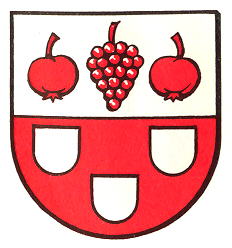Hösslinsülz: Difference between revisions
Knorrepoes (talk | contribs) m (Text replacement - "|center|Wappen von {{PAGENAME}}]] " to "|center|alt=Wappen von {{PAGENAME}} / Arms of {{PAGENAME}}]] ") Tags: Mobile edit Mobile web edit |
Knorrepoes (talk | contribs) m (Text replacement - " / Arms" to "/Arms") |
||
| Line 7: | Line 7: | ||
Incorporated into : 1975 [[lowenste|Löwenstein]] | Incorporated into : 1975 [[lowenste|Löwenstein]] | ||
[[File:hosslins.jpg|center|alt=Wappen von {{PAGENAME}} / Arms of {{PAGENAME}}]] | [[File:hosslins.jpg|center|alt=Wappen von {{PAGENAME}}/Arms of {{PAGENAME}}]] | ||
{| class="wikitable" | {| class="wikitable" | ||
Revision as of 11:14, 2 September 2022
This page is part of the German heraldry portal Deutsche Wappensammlung |
Heraldry of the World |
|
German heraldry:
|
Selected collector's items from Germany:
|
HÖSSLINSÜLZ
State : Baden-Württemberg
District (Kreis) : Heilbronn
Incorporated into : 1975 Löwenstein
| German |
In geteiltem Schild oben in Silber eine rote Traube zwischen zwei roten Äpfeln, unten in Rot drei (2:1) silberne Schildchen. |
| English | No blazon/translation known. Please click here to send your (heraldic !) blazon or translation |
Origin/meaning
Hösslinsülz had no seal or arms when in 1913 the State Archives proposed a combination of the lion of Calw (see Löwenstein) in the upper half, and three silver shields in the lower half (Weinberg). The village belonged until 1441 to Löwenstein and afterwards to Weinberg. The local council did not adopt the arms, and in 1938 the archives proposed the same arms, again the council did not adopt arms.
In 1949 the council adopted the above arms in which the Löwenstein lion was replaced by symbols of agriculture.
Contact and Support
Partners:
Your logo here ?
Contact us
© since 1995, Heraldry of the World, Ralf Hartemink 
Index of the site
Literature : Gönner, 1965












